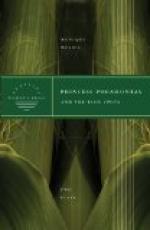Suppose then—the thought flashed through his brain—that he, Claw-of-the-Eagle, should make this wish a fact! Powhatan would never punish the doer of the deed.
He crept nearer still to the sleeping man, loosening the knife in his girdle. There was no sound within the lodge, only the faint crooning of Pocahontas without; yet something, some feeling of danger, aroused the Englishman. Through his half-closed lids he scarce distinguished the slowly advancing red body from the red earth over which it was moving. But when the boy was close enough to touch him with the outstretched hand. Smith opened his eyes wide. He did not move, did not cry out, though he saw the knife in the long thin fingers; all he did was to fix his gaze sternly upon the boy’s face. Claw-of-the-Eagle tried to strike, but with those fearless eyes upon him he could not move his arm.
Slowly, as he had come, he crawled back to the entrance, unable to turn his head from the man who watched him. It was only when he was out in the air again that he felt he could take a long breath.
“He is a good sleeper,” was all he remarked.
“And doubtless he is as good an eater and will be hungry when he wakes. Wilt thou not stop at our lodge, Claw-of-the-Eagle, and bid them bring me food for him?”
He did as she asked, and shortly after the squaws arrived with earthen dishes filled with bread and meat. They peered eagerly through the crevices till Pocahontas commanded them to be off. Hearing a noise within the lodge, she was about to bear the food inside when Smith stepped to the entrance.
He was astonished to see the kind of sentinel they had set to guard him. He had expected to find that his unexpected guest would be waiting outside for another chance at his life, and he preferred to hasten the moment. He realized that this maiden, however, would be as efficient a gaoler as a score of braves. Should he dream of escaping, of finding his way without guides or even his compass, back to Jamestown, her outcry would bring the entire village to her aid. He recognized his saviour of the day before and bowed low, a bow meant for the princess and for his protector. Pocahontas, though a European salutation was as strange to her as Indian ways were to him, felt sure his ceremonious manner was intended to do her honor, and received it gravely and graciously.
“Here is food for thee, White Chief,” she said, placing it on a mat she had spread on the ground; “sit and eat.”
“It is welcome,” he answered, “yet first harken to me. I have not words of thy tongue, little Princess, to pay thee for thy great gift, and though my words were as plentiful as the grains of sand by the waters, they were still too few to offer thee.”
“Gifts made to chiefs,” she answered with a dignity copied from her father’s, “can never pay for princely benefits.”
Smith could not help smiling at the grandiloquence of the child’s language, for in spite of her height, he realized that her years were but few.




